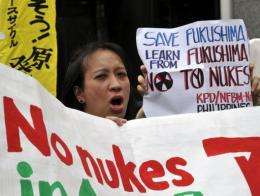A woman shouts slogans during a protest against the dangers of nuclear power outside the headquarters of Japanese utility group TEPCO in Tokyo. Japan has approved the full resumption of commercial operations of an atomic reactor for the first time since the March 11 earthquake and tsunami sparked the Fukushima nuclear accident.
Japan on Wednesday approved the full resumption of commercial operations of an atomic reactor for the first time since the March 11 quake and tsunami sparked the Fukushima nuclear accident.
Hokkaido Electric Power Co. restarted commercial operations at the Tomari plant's reactor number three at 0700 GMT, shortly after receiving the official go-ahead from the central government, a HEPCO spokesman told AFP.
Almost three quarters of Japan's 54 reactors are now offline, mostly for regular safety checks, and many host communities have been reluctant to approve their restarts as anti-nuclear sentiment has grown in the quake-prone nation.
Prime Minister Naoto Kan has said he would like to phase out nuclear power in the long term, but for now the Ministry of Economy, Trade and Industry (METI) wants to resume reactor operations amid a summer electricity crunch.
Atomic plants met about one third of Japan's energy needs before the quake disaster, and business groups have warned that power shortages spell a serious threat to industry in the world's third-biggest economy.
The number three reactor at the Tomari plant, on the northern island of Hokkaido, had officially been in a test phase, although it had been running for months and producing electricity at full capacity.
Hokkaido's Governor Harumi Takahashi, after local debate on the plant's safety, said Wednesday she had "no objection" to the government declaring the safety test complete and allowing a return to full operations.
Once she formally relayed the message, METI issued a safety certificate allowing HEPCO to officially resume commercial operations.
A regular inspection of the reactor was launched in January, and the unit was restarted in a so-called adjustment operation on March 7, days before the earthquake. It has been operating ever since.
METI's nuclear watchdog agency said additional safety tests that followed the quake were completed last week.
(c) 2011 AFP
























